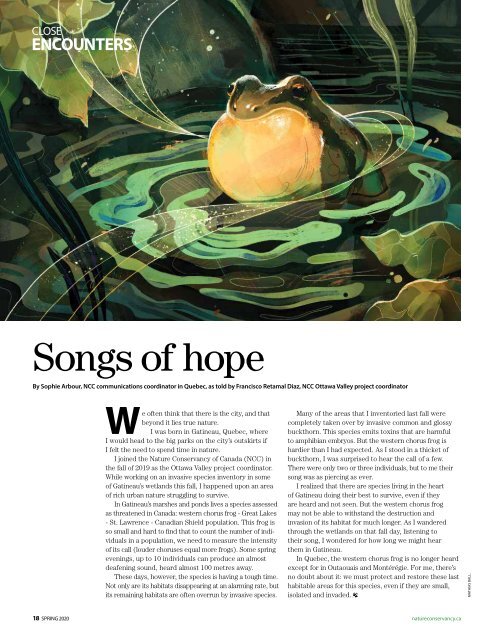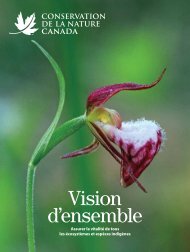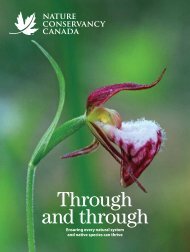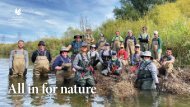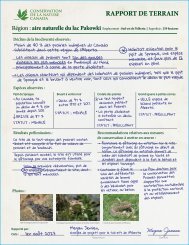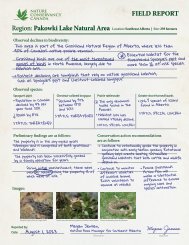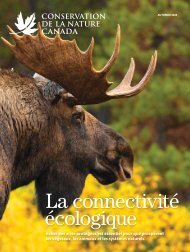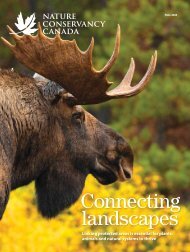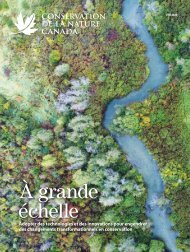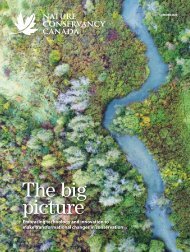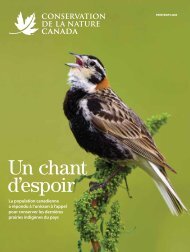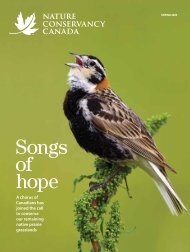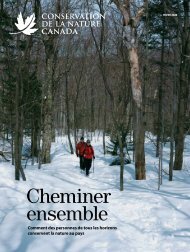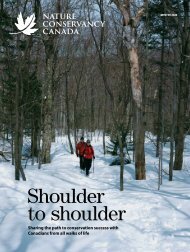You also want an ePaper? Increase the reach of your titles
YUMPU automatically turns print PDFs into web optimized ePapers that Google loves.
CLOSE<br />
ENCOUNTERS<br />
Songs of hope<br />
By Sophie Arbour, <strong>NCC</strong> communications coordinator in Quebec, as told by Francisco Retamal Diaz, <strong>NCC</strong> Ottawa Valley project coordinator<br />
We often think that there is the city, and that<br />
beyond it lies true nature.<br />
I was born in Gatineau, Quebec, where<br />
I would head to the big parks on the city’s outskirts if<br />
I felt the need to spend time in nature.<br />
I joined the Nature Conservancy of Canada (<strong>NCC</strong>) in<br />
the fall of 2019 as the Ottawa Valley project coordinator.<br />
While working on an invasive species inventory in some<br />
of Gatineau’s wetlands this fall, I happened upon an area<br />
of rich urban nature struggling to survive.<br />
In Gatineau’s marshes and ponds lives a species assessed<br />
as threatened in Canada: western chorus frog - Great Lakes<br />
- St. Lawrence - Canadian Shield population. This frog is<br />
so small and hard to find that to count the number of individuals<br />
in a population, we need to measure the intensity<br />
of its call (louder choruses equal more frogs). Some spring<br />
evenings, up to 10 individuals can produce an almost<br />
deafening sound, heard almost 100 metres away.<br />
These days, however, the species is having a tough time.<br />
Not only are its habitats disappearing at an alarming rate, but<br />
its remaining habitats are often overrun by invasive species.<br />
Many of the areas that I inventoried last fall were<br />
completely taken over by invasive common and glossy<br />
buckthorn. This species emits toxins that are harmful<br />
to amphibian embryos. But the western chorus frog is<br />
hardier than I had expected. As I stood in a thicket of<br />
buckthorn, I was surprised to hear the call of a few.<br />
There were only two or three individuals, but to me their<br />
song was as piercing as ever.<br />
I realized that there are species living in the heart<br />
of Gatineau doing their best to survive, even if they<br />
are heard and not seen. But the western chorus frog<br />
may not be able to withstand the destruction and<br />
invasion of its habitat for much longer. As I wandered<br />
through the wetlands on that fall day, listening to<br />
their song, I wondered for how long we might hear<br />
them in Gatineau.<br />
In Quebec, the western chorus frog is no longer heard<br />
except for in Outaouais and Montérégie. For me, there’s<br />
no doubt about it: we must protect and restore these last<br />
habitable areas for this species, even if they are small,<br />
isolated and invaded.1<br />
MATHIAS BALL.<br />
18 SPRING <strong>2020</strong> natureconservancy.ca


